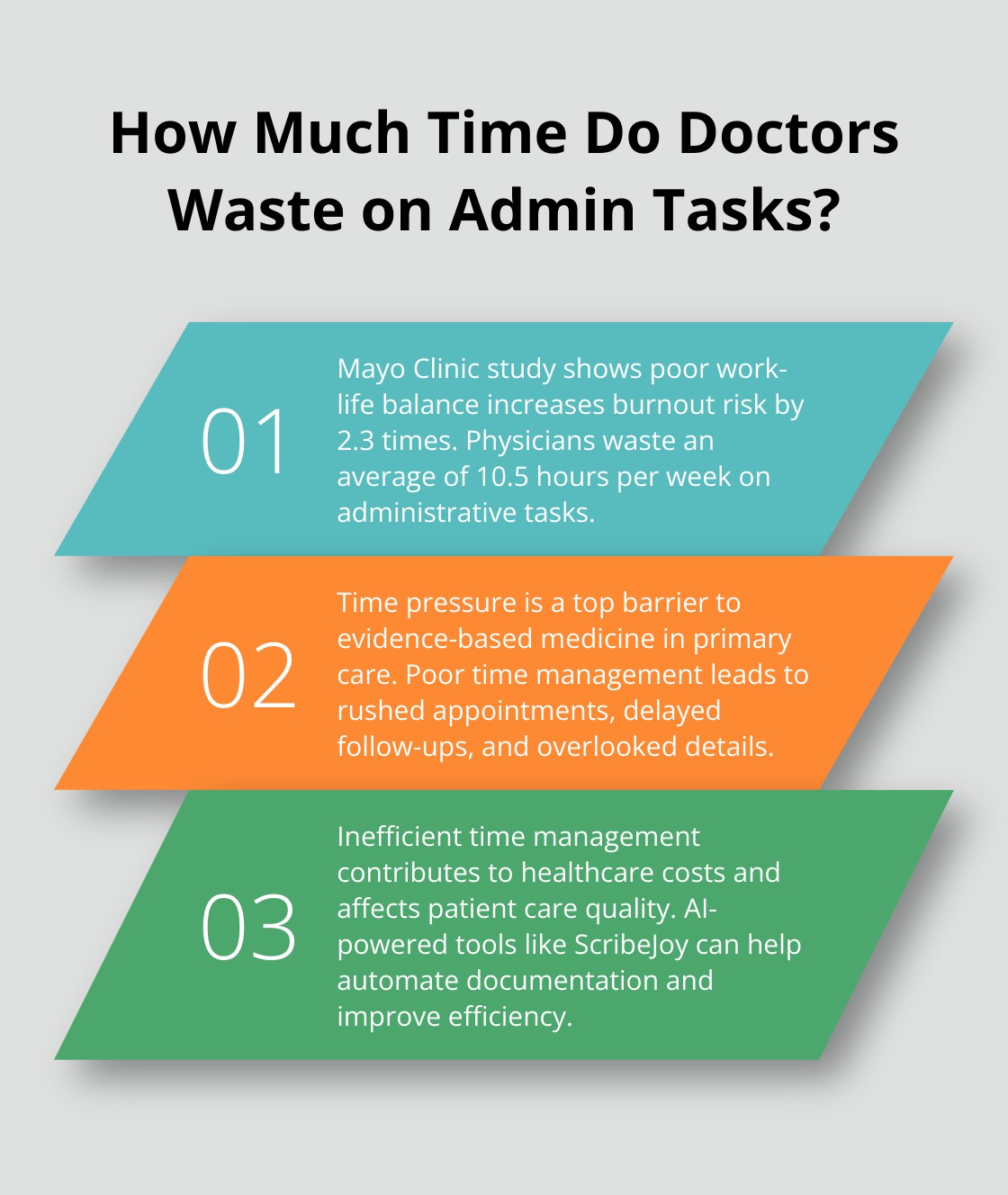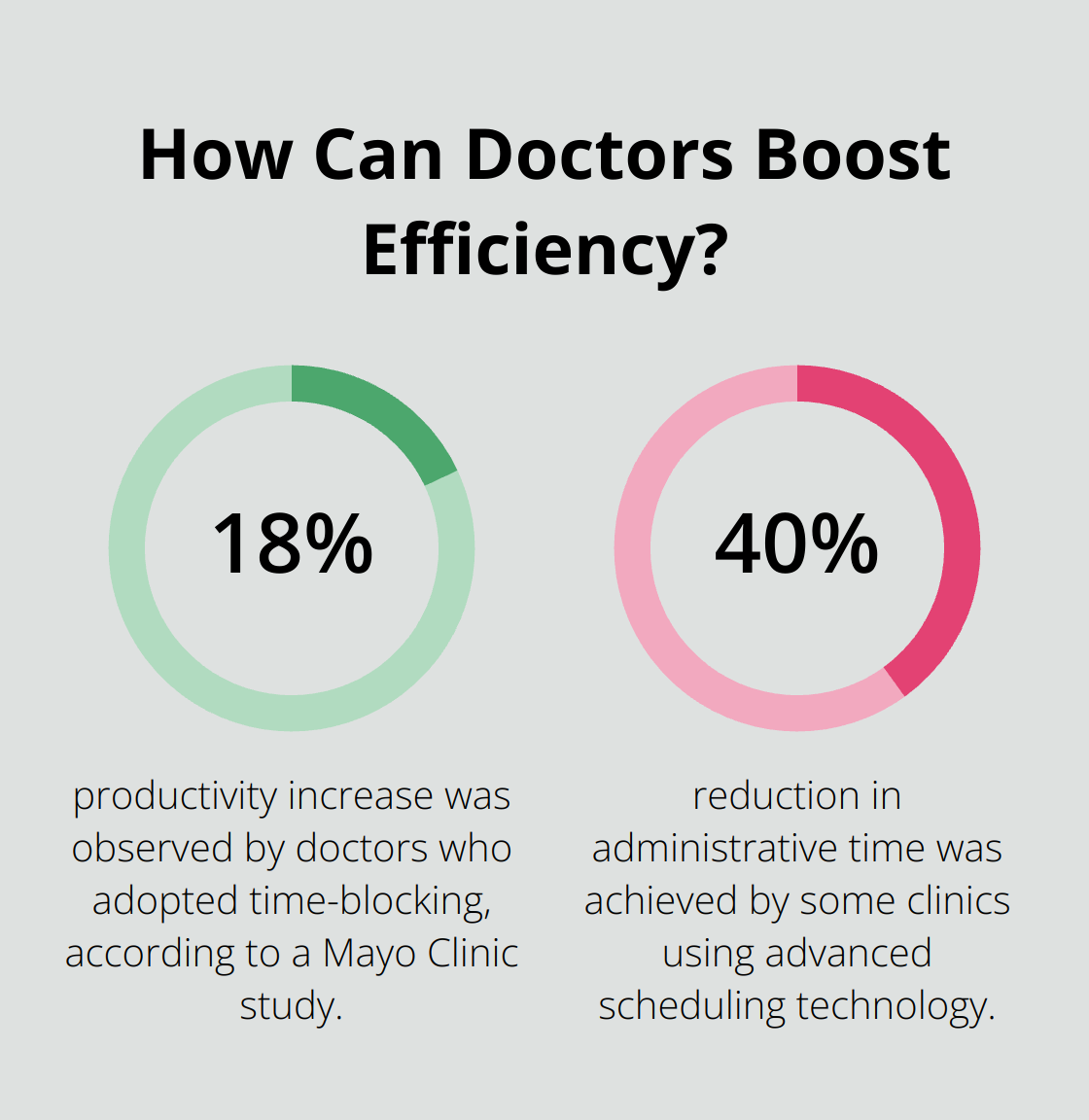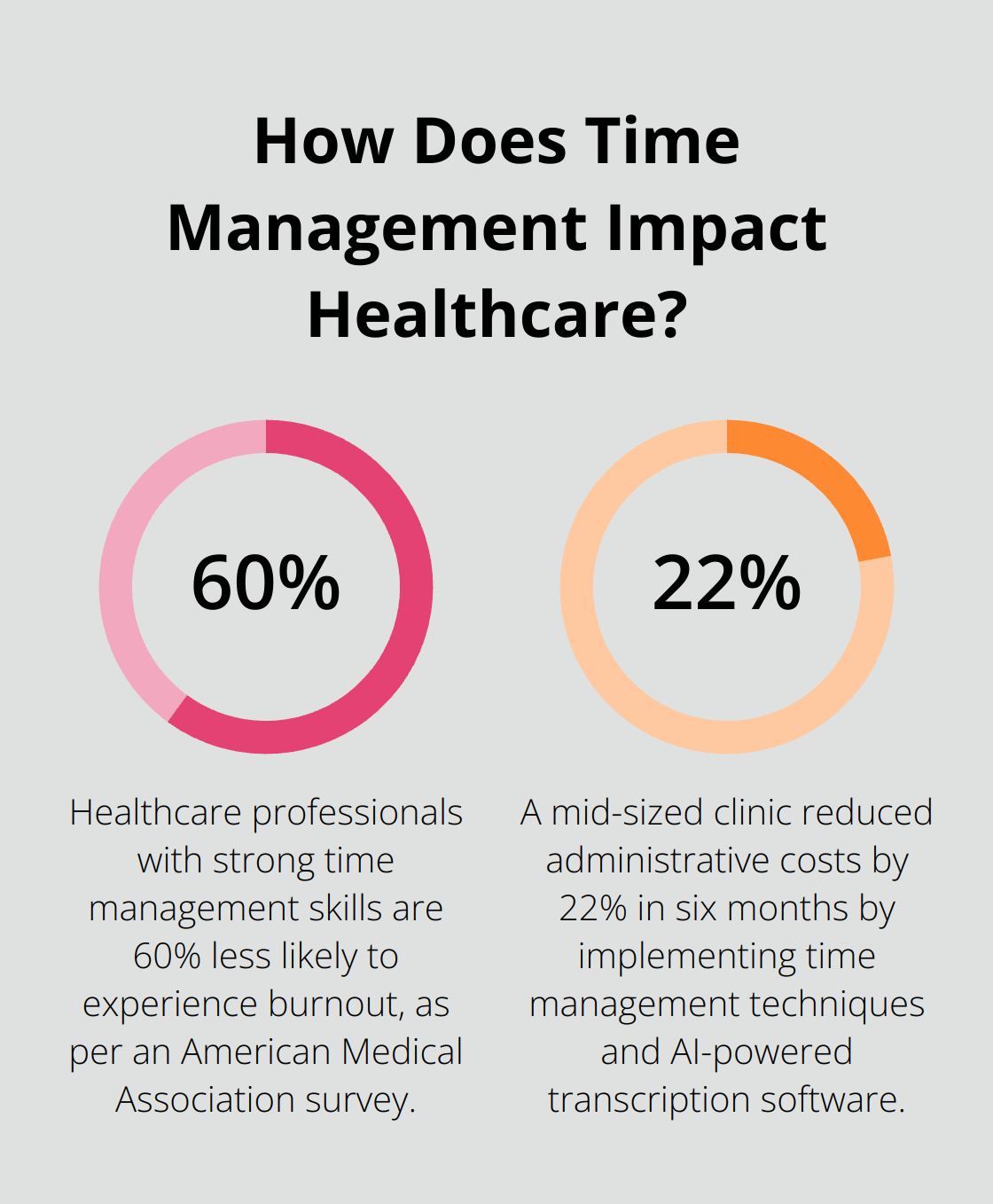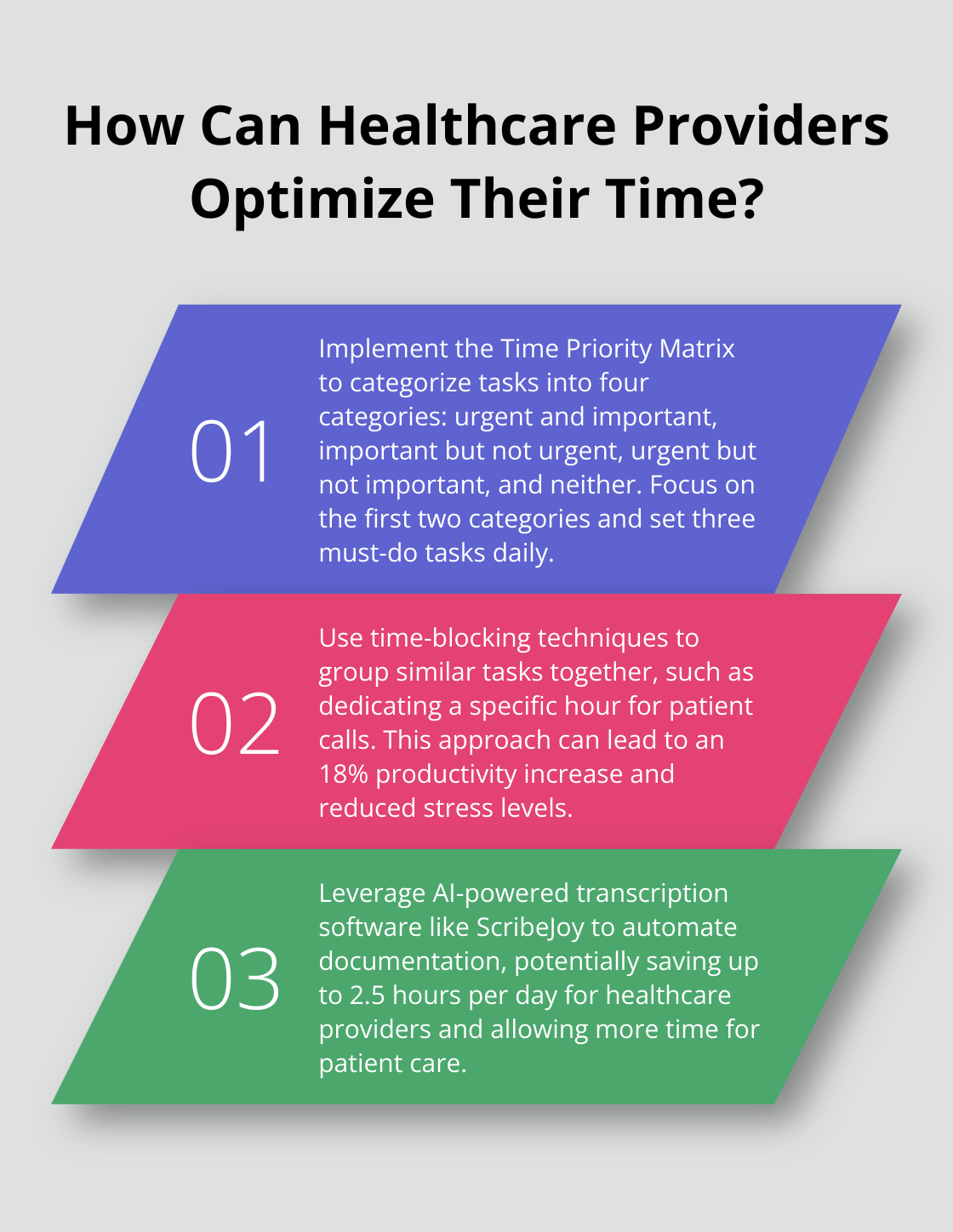Time management in healthcare — big deal, right? Well, it’s a make-or-break skill. Screw it up, and you’re staring down burnout, subpar patient care, and a nice heap of medical errors. Not great.
Over at ScriberJoy, we’re all about showing how nailing time management can flip the script for healthcare practices. This isn’t just fluff. We’re diving into why it matters and dishing out practical tips so healthcare providers can crank up their efficiency and give patient outcomes a shot of adrenaline.
The Hidden Costs of Poor Time Management in Healthcare
Time management in healthcare…not just about checking boxes-it’s the under-the-radar assassin of efficiency and quality care. Let’s dive into how this slippery slope of mismanaged time wrecks the house for healthcare providers and patients alike.
The Burnout Epidemic
Healthcare providers are knee-deep in a burnout tsunami, and poor time management? It’s throwing fuel on the fire. Check this-Mayo Clinic found that docs with lousy work-life balance were 2.3 times more likely to face burnout. It’s a vicious cycle: bad time management forces longer hours, missed breaks, and forgotten personal time-just mix those up for a mental and physical spiral.
Patient Care Suffers
When providers are stretched thinner than a New York slice, patient care? Yeah, it takes a nosedive. The American Medical Association spills the beans-physicians waste an average of 10.5 hours per week on admin tasks (Hello, paperwork, my old foe). Cue rushed appointments, delayed follow-ups, and, oops, overlooked details…all leading to misdiagnoses and weak treatment strategies.
The Error Domino Effect
Time pressure-it doesn’t just add stress-it stacks up the error deck. Research says it’s a top barrier to evidence-based medicine in primary care. And those errors? Not just a budget buster-they can cost lives. Time management isn’t just about ticking to-dos; it’s a frontline defense for patient safety.
The Financial Drain
Let’s talk money-a poorly managed schedule is like leaving the tap running. Skyrocketing healthcare costs mean people can’t afford medical care or drugs, insurance or not. Every second wasted is cash down the drain-and in healthcare, those Benjamins stack up real quick.

To tackle this, providers need time management hacks and tools that actually work. Solutions like ScribeJoy bring in AI-powered transcription-that’s precious minutes back for patient care. Automate that documentation and boom-focus shifts back to what truly matters: offering top-notch care without the burnout blues.
Next up, we’ll dig into practical time management strategies that can jumpstart efficiency and transform healthcare practices. Stay tuned.
How Healthcare Providers Can Master Time Management
Time management-it’s not just another jargon-it’s survival for healthcare providers buried under mountains of paperwork and an endless stream of patient demands. Let’s ditch the fluff and dig into what really moves the needle.
Ruthless Prioritization
Here’s the deal: not everything is life-or-death urgent. Spoiler alert-it’s not. Utilize the Time Priority Matrix to categorize tasks into four bins: urgent and important, important but not urgent, urgent but not important, and neither. Zero in on the first two and leave the leftovers-delegate them or let them go.

Pro tip: Lock down your top three must-dos every day. Everything else? Extra credit. Forget aiming for perfection-aim for getting the right stuff done effectively.
Delegate Like Your Career Depends on It
Because, spoiler, it does. Delegating work isn’t just a nice idea-it lowers the nursing load and promotes teamwork. But here’s the twist: many healthcare folks can’t seem to delegate.
Get comfortable with letting some strings go. Coach your team. Trust them with tasks that don’t need your magic touch. It’s less about passing the buck-more about making your expertise count where it truly counts.
Time-Blocking: Your New Best Friend
Wave goodbye to multitasking-it’s a productivity assassin. Time-blocking is your new game. Set aside solid chunks of time for similar tasks. Consider lumping all those patient calls into one power hour instead of sprinkling them around like confetti.
A Mayo Clinic study found that doctors who embraced time-blocking saw an 18% productivity bump and felt less stressed. That’s what we call a twofer.
Leverage Technology (But Choose Wisely)
Technology-it’s either a lifeline or a minefield. Choose tools that address your core issues.
For documentation, go for AI-powered transcription software like ScribeJoy, and watch the hours pile up. One hospital shaved off 2.5 hours per doc per day using similar tech.
When it comes to scheduling, check out AI-powered tools that fine-tune your calendar around task needs and energy levels. Some clinics trim admin time by 40% with slick scheduling tech.
The endgame isn’t about juggling more-it’s about carving out time for the big stuff: patient care and your own sanity. These skills? They’re not just trailing-the-pack options; they’re the playbook for thriving in today’s fast-paced medical world. Master them, and you’ll not only boost your efficiency but also reconnect with the reason you entered medicine in the first place.
Now that we’ve spitballed the strategies, let’s roll into the concrete perks of ace time management in healthcare. Here’s why these tactics are not optional extras but vital for thriving in today’s medical ecosystem.
How Better Time Management Transforms Healthcare
Time management in healthcare isn’t just a fancy term for squeezing more out of each minute-it’s the magic ingredient that can shake up medical practices for the better. Let’s dive into the real-world wins that healthcare pros can harness when they make time their trusty sidekick.
Patient Satisfaction and Health Outcomes Soar
Nailing time management can supercharge patient experiences and health metrics. The Press Ganey’s “4C model” injects purpose into every nook and cranny of patient care-from getting those test results to the entire healthcare rollercoaster. This approach? It spells out better health and happier patients.
Productivity Skyrockets
Smart time juggling means cranking up productivity without clocking in extra hours. The Mayo Clinic? They nailed it with a case study showing docs bumping up productivity by 18% thanks to time-blocking wizardry.

In everyday terms, that translates to seeing more patients without dropping the ball on quality. Think-5 to 7 extra patient visits a day for your average primary doc, pumping up both community health and practice profits.
Work-Life Balance Becomes Reality
Healthcare burnout’s burning through a monstrous $4.6 billion a year for the U.S. system (Annals of Internal Medicine). But-get this-an American Medical Association survey reveals healthcare folks with killer time skills are 60% less likely to fry out.
What’s the upshot for providers? It’s punching out on time, fewer weekends knee-deep in patient charts, and more of your own time-all key to keeping career joy alive and burnout at bay.
Cost Savings and Resource Optimization
Efficient time management isn’t just a win for docs-it’s a boon for the entire healthcare machine with sharper resource smarts. The Institute of Medicine? They reckon trimming inefficiencies could slash U.S. healthcare costs by a jaw-dropping $765 billion annually.
Zooming in-one mid-sized clinic carved out a 22% cut in admin costs in a mere six months by hopping on time management techniques and tapping into AI-powered transcription software. These bucks? They can flow back into patient care, fresh tech, or staff upskilling.
Time management in healthcare isn’t just nice to have-it’s a no-brainer must-have. The upsides ripple across the whole healthcare board, from keeping providers happy to boosting system-wide efficiency. As healthcare costs climb and service demand skyrockets, getting a grip on time becomes the ticket to the future of healthcare.
Final Thoughts
Time management in healthcare-it’s the secret sauce that turns chaos into something resembling a well-oiled machine. Master this, and you’re not just surviving, you’re thriving. Doc performance? Up. Patient outcomes? Better. And guess what? You might just reclaim your weekends. Tools like ScribeJoy? These are your knights in digital armor, cutting through the clutter so you can get back to what really matters-patient care.

Nailing time management isn’t just a matter of waving a wand. It takes grit and practice. But man, is it worth it. Healthcare pros who prioritize time management will become the Jedi of this evolving landscape. We’re talking about upgrading your practice, enhancing patient care, and hey-finding joy in what you do again.
Here’s the lowdown: the future of healthcare needs efficiency, laser-focus on patients, and some serious balance. Time management skills and tools (think AI-powered transcription) are going to be the keys to the kingdom. Those who invest in this today? They’re the trailblazers. They’re the ones setting the stage for a more efficient, satisfying healthcare system, now and in the future.

Leave a Reply
You must be logged in to post a comment.